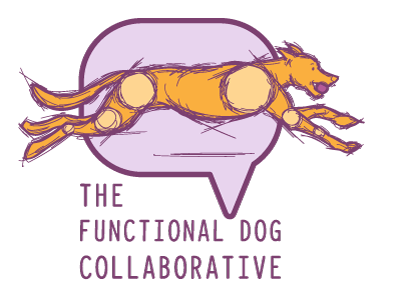Podcast
Introduction to the Functional Dog Collaborative with Jessica Hekman
Jessica Hekman: Welcome to the Functional Breeding Podcast. I’m Jessica Hekman, and I’m here interviewing folks about how to breed dogs for function and for health: behavioral and physical. This podcast is brought to you by the Functional Dog Collaborative, an organization founded to support the ethical breeding of healthy, behaviorally sound dogs. FDC’s goals include providing educational, social, and technical resources to breeders of both purebred and mixed breed dogs. You can find out more at www.functionalbreeding.org, or at the Functional Breeding Facebook Group, which is a friendly and inclusive community. I hope you have fun and learn something.
Jessica Hekman: Hi, friends. Welcome to the introductory episode of the Functional Breeding Podcast in which I tell you what we are actually doing here. I’m your host, Jessica Hekman. The Functional Breeding Podcast is an interview-based podcast about breeding dogs. There are lots of different approaches to dog breeding and the ones we’re interested in here are the ones really focused on function. Is the breeder’s primary goal to make a good pet, a good sport dog, or maybe a good working dog?
With that in mind, I won’t only be talking to people who breed purebreds. I hope to do a deep dive into the world of sport mix breeding and talk to people who breed mixes for pets and mixes for working dogs. I want to look at who’s out there really tackling the problems of how to balance predictability, which is important to all of us, versus health, physical and behavioral. Because predictability versus health, those things can be in conflict. What are people’s different approaches? What results have they seen? What kinds of problems have they encountered?
And I have plans to talk to folks from the working dog world who manage large breeding colonies. Well, large by dog standards, and also to talk to researchers who study animal breeding. So you might even get to hear from some cow folks.
It occurs to me that not everyone who is listening to this podcast may actually know me. Hopefully, there’s someone out there listening besides my training buddies. Hi, Sue! Hi Kim!
I am a veterinary researcher. I study the genetics of dog behavior at the Broad Institute of MIT and Harvard. It’s this institute that studies human health. But we are the little, lone lab that studies other mammals. We study dogs in our lab as much as we can when we can find funding to do it, which is harder and harder these days. I’ve always been passionate about behavior and welfare, and I believe genetics is important to both. I really like to prevent problems before they start. That’s the most effective way of dealing with problems, and what earlier prevention is there than the genetic level?
2:54
So I have this ulterior motive for starting this podcast. And it’s not just getting to learn more about a crazy variety of breeding practices. The podcast is part of a new organization called the Functional Dog Collaborative. The thought is that I’ll get to introduce people to the FDC through the podcast, and start to build a community around it. Right now, the Functional Dog Collaborative is not much more than a website (www.functionalbreeding.org), and this podcast. Actually, today I am deep in the middle of figuring out the perfect logo with our amazing logo designer, Nienke de Haan. Logos are hard, folks! Who knew? But in the beautiful completed structure in my head, the FDC is a central place for dog breeders to go for educational, and social, and technical resources. So let me unpack a little bit about what I mean by all of that.
Educational resources first. I have been teaching dog trainers and behavior consultants about the genetics and biology of behavior for a few years now at a variety of places. And there are some amazing resources out there already for breeders. But there are gaps. So if you’re a beginning breeder, and maybe you don’t have a breed club to support you, because you’re not breeding purebreds, and maybe you don’t even really know how to be a good breeder, and maybe you don’t even know what you don’t know, then where do you go?
What if there was a recommended list of curriculum topics, and you could know that if you covered most of those, you’d have a good solid foundation, something to start you off right for breeding? And for each topic, maybe a pointer to where you could go to get that information, be it an online webinar or an in-person seminar, a book, an online course. Some volunteers have already started working on making that list of topics for the Functional Dog Collaborative. And the next step is to find recommended resources for each one. And the step after that is to try to fill the gaps.
So I really don’t want us to have to build our own educational platform. I’m really hoping we can just incentivize the creation of online classes with some other existing groups. But we’ll see how that goes. If we need to build our own platform, we will.
So yeah. If you have thoughts about what should be included in that list, or some gap in existing resources for dog breeding that really bugs you that you want filled, let us know at the Functional Breeding Facebook group, or at the FDC website, www.functionalbreeding.org.
Which brings me to the second thing that FDC will offer in this glowing future, which is social support and social interaction. We already have the Facebook group as a place to start. And it is a really lovely community so far. Very friendly, very supportive. As it grows, I know there may need to be some work to keep it that way. And I’m committed to that. I think it’s going to be very important to have a place for open conversations about different breeding decisions in which people don’t feel judged or attacked.
Beyond a Facebook group… There’s a world beyond Facebook? There will be again, post COVID! I envision in-person conventions, maybe yearly. Wow, if this thing grew large enough, then even more often. Sort of like a mix between national specialties and sports dog camp. We’d have people getting together meeting in person. That’s the really important part. But also in-person educational opportunities, for sure. There would definitely be connected sports events: obedience, rally, agility, flyball, all of that for sure. Perhaps health clinics, including, I really hope, having a sports veterinarian on-site to give orthopedic exams and to offer insights into individual dog structure, and whether they are good breeding candidates given the function that the breeder is considering.
So then the third arm of the FDC would be a database for breeders to put health and pedigree information into so that we can all make better-informed mate selection decisions. There are some excellent examples of such databases out there for different purebreds. Sorry, for different breeds. And I really hope we can find a way to interoperate with them. Although my own computer programmer background tells me that that is going to be quite a difficult problem.
Maybe the bigger problem though, is going to be overcoming the challenge of supporting people to where they feel comfortable making all the health information about their dogs public. Right now, there are no good incentives for doing that. In fact, people are really actually positively punished when they do it. So it’s going to be really important that this database have a strong social support system that makes it really, truly okay to tell the world that your breeding dog had a seizure, for example. Everyone needs to deeply believe that telling that story is a good thing. Because the alternative is that dogs with health problems get bred and the puppies get sold and no one knows that these health problems even exist in the lines. We can deal with health problems, but we have to know that they exist.
So building this database is going to take a lot of technical expertise. And therefore I just sucked in someone who was already doing it. Brian Batchelder is one of our founding, I guess you’d call them, board members. We haven’t incorporated yet but that’s basically what these folks are doing. He has a passion project of building just such a database for sport mix dogs. So we’re piggybacking on that project. Ryan was also the one who did the heavy lifting to get the new website set up. I have definitely learned from my boss in my day job that if someone is doing something that might look like competition, you should just turn it into a collaboration.
8:30
We have two other board members: Sarah Reusche of Paws Abilities Dog Training, and Trish McMillan who is an internationally known behavior consultant and speaker. We also have a bunch of volunteers who have been essential in getting things off the ground. We’re focusing on this podcast for now to see how well that’s going, and the initial curriculum list of topics. So if all this is something that interests you, I encourage you to come check out our Functional Breeding Facebook group. Of course, I’d love you if you came to volunteer. But I’d also love you if you started a thoughtful and friendly conversation about breeding. It’s a great group so far with members who have decades of breeding experience, members who are just starting out breeding, and of course, members who don’t ever intend to breed dogs, but love dogs and want to own healthy and behaviorally resilient ones. So that is the podcast and the FDC.
At this point. I think I’m supposed to tell you to subscribe. That seems to be helpful in some way. And I’m looking forward to recording more episodes of this podcast. I hope you enjoy them. And thank you for listening.
Thanks so much for listening. The Functional Breeding Podcast is a product of the Functional Dog Collaborative and was produced by Sarah Espinosa Socal. Come join us at the Functional Breeding Facebook group to talk about this episode or about responsible breeding practices in general. To learn more about the Functional Dog Collaborative, check out www.functionalbreeding.org. Enjoy your dogs.
Copyright © 2021 Functional Dog Collaborative. All rights reserved.


